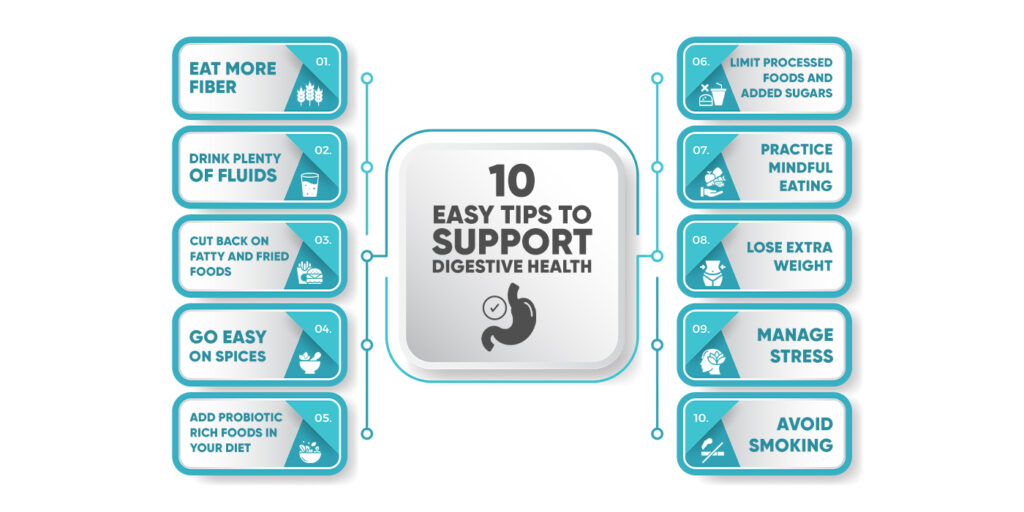We don’t often pay attention to our digestive system—until something goes wrong. Whether it’s bloating after a meal, frequent heartburn, or just poor digestion can throw off your entire day. Your gut plays a bigger role in your overall health, more than you might realise. The good news is, you can support your digestive health naturally with a few simple strategies.
In this blog, we are going to explore 10 easy and effective digestive health tips , which can make you feel lighter, more energised, and at ease with your body.

1. Eat More Fiber:
Fiber plays an important role in supporting your digestive health. Fiber helps regulate your bowel movements, supports healthy gut bacteria, and even prevents constipation and bloating. If you’re not getting enough fiber, your digestive system has to work a lot harder, which can lead to bloating, discomfort, and irregularity.
Try adding more of these foods in your diet:
- Fruits
- Vegetables
- Whole grains
- Legumes
- Nuts
Start slow if you’re not adjusted to high fiber foods, and drink plenty of water to help fiber do its job properly.
2. Drink Plenty of Fluids:
You have probably heard that good hydration is important, but when it comes to digestive health, it is essential. Water helps break down food, absorb nutrients, and soften your stool to prevent constipation.
Try to drink at least 8 glasses of water everyday, or more if you are physically active or live in a warm climate.
You can also take herbal teas, infused water, and broths to increase your fluid intake. Just try to avoid sugary drinks and sodas, they can do more harm than good for your gut.
3. Cut Back on Fatty and Fried Foods:
While a plate of crispy fries or greasy burgers may look tempting at the moment, your gut often pays the price later. Fatty and fried foods are harder for your body to break down, which can slow digestion and lead to bloating, gas, or acid-reflux. They also tend to stay longer in your stomach and make you feel heavy and uncomfortable.
Let’s be clear, not all fats are bad. Your body actually needs healthy fats for energy, hormone balance, and nutrient absorption. Just try to reduce saturated and trans fats and focus more on heart-friendly fats like avocado, olive oil, chia seeds, flaxseeds, and nuts.
You can also opt for lighter cooking methods like baking, steaming, or grilling, rather than deep frying your food.
4. Go Easy On Spices:
If your mouth is on fire, your stomach might be too. Spicy foods can be a problem for some people, especially if you suffer from acid reflux, ulcers, or sensitive digestion. While fiery ingredients like chilli peppers often get the blame, even mild flavour boosters like garlic and onion can trigger heartburn or upset your stomach.
Learn more about foods that can trigger acid reflux or GERD.
If you feel cramping, bloating, or diarrhea after eating spicy foods, it might be time to go easy on spices, especially if you are already dealing with digestive issues like acid reflux or irritable bowel syndrome (IBS).
5. Add Probiotic-Rich Foods In Your Diet:
Your gut is a home to trillions of bacteria, and many of them play an important role in digestion. Probiotics are those good bacteria that are found naturally in our gut. They help to keep your gut balanced and support your immunity.
Incorporate probiotic-rich foods in your diet such as live yoghurt, kimchi, and kefir. However, add them into your diet slowly, especially if you are new to fermented foods.
Probiotics are also available in the form of supplements. But if you already have a health condition or have a weakened immune system, always consult with your doctor before taking probiotic supplements.
6. Limit Processed Foods and Added Sugars:
Let’s face it, processed foods are convenient, but they come at a cost to your gut. Many packaged and fast foods are loaded with additives, refined sugars, and unhealthy fats that can disturb your digestive system and harm your gut bacteria.
Whenever you can, choose whole foods over packaged options. Fresh vegetables, whole grains, and healthy fats not only help with your digestion, but also make you feel fuller and satisfied.
7. Practice Mindful Eating:
In a world where we are always multitasking, it’s easy to eat without really thinking about it—gulping down lunch at your desk or snacking while scrolling your phone.
Mindful eating helps your body for digestion and lets you recognise when you’re truly full.
Sit down, slow down, and actually savor your food. Take small bites, chew thoroughly, and give yourself time to enjoy your meal. It sounds simple, but it makes a big difference.
8. Lose Extra Weight:
Carrying extra weight especially around your tummy can put extra pressure on your internal organs, including digestive tract. This can increase your chance of developing acid reflux, GERD, and other digestive issues.
Sustainable weight loss with balanced meals and regular activity can improve your digestion and overall well-being.
9. Manage Stress:
Have you ever felt your stomach twist in knots when you are stressed or anxious? That’s not just in your head, your gut and brain are deeply connected. Stress has significant effects on the mind and body.
Stress can throw your digestive system off balance. For some people it slows down everything leading to bloating, discomfort, and constipation. For others, it speeds things up, causing diarrhea or frequent trips to the bathroom. Some people even lose their appetite entirely, when stressed.
On top of that, stress can also make existing digestive conditions such as ulcers and irritable bowel syndrome (IBS) even worse.
So, managing your stress and taking care of your mental well-being can go a long way in supporting your digestive health.
10. Avoid Smoking:
Smoking doesn’t just harm your lungs— it is well-known for damaging the respiratory system (learn more here) — but it can also take a serious toll on your digestive health.
Smoking weakens the muscles that keep stomach acid in place, and causes acid reflux or GERD. It also increases the risk of conditions such as stomach ulcers, crohn’s disease, and even cancer of stomach and colon.
If you are a smoker, quitting can be a game changer, not just for your gut but for your entire body.
There are many resources and support systems out there like NHS stop smoking services , that can help you quit smoking. You can contact them to find support and help.
Final Thoughts:
Taking care of your digestive health doesn’t have to be overwhelming or complicated. In fact, it often comes down to being mindful about your everyday habits like what you eat, how you eat, how you move, and how you manage your stress. By making some simple changes like adding more fiber to your diet, drinking more water, and cutting back on processed foods can make a big difference.
Be kind to your gut, it is working hard for you every single day!








